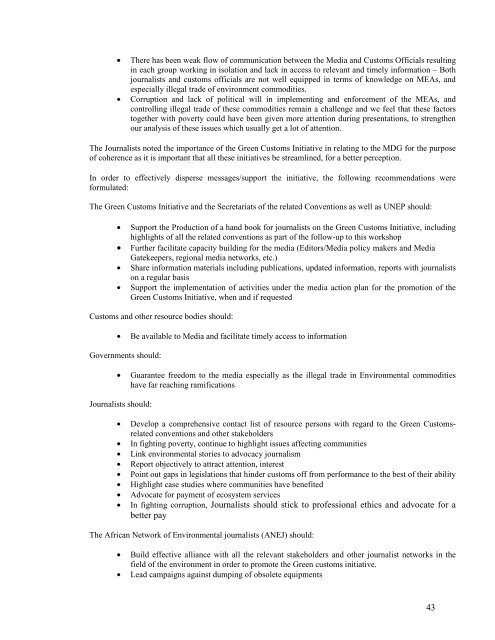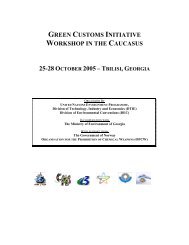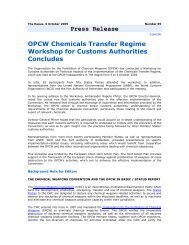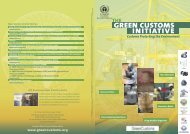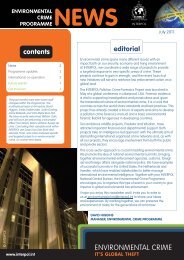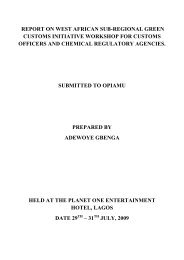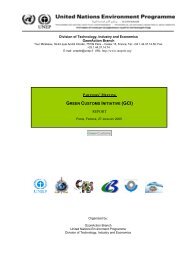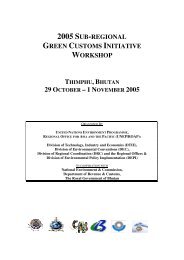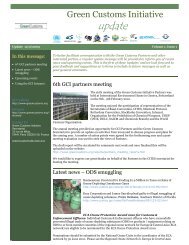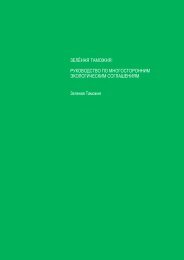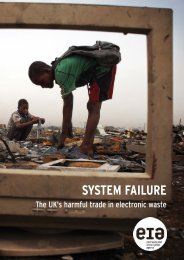Arusha - Green Customs Initiative
Arusha - Green Customs Initiative
Arusha - Green Customs Initiative
You also want an ePaper? Increase the reach of your titles
YUMPU automatically turns print PDFs into web optimized ePapers that Google loves.
• There has been weak flow of communication between the Media and <strong>Customs</strong> Officials resulting<br />
in each group working in isolation and lack in access to relevant and timely information – Both<br />
journalists and customs officials are not well equipped in terms of knowledge on MEAs, and<br />
especially illegal trade of environment commodities.<br />
• Corruption and lack of political will in implementing and enforcement of the MEAs, and<br />
controlling illegal trade of these commodities remain a challenge and we feel that these factors<br />
together with poverty could have been given more attention during presentations, to strengthen<br />
our analysis of these issues which usually get a lot of attention.<br />
The Journalists noted the importance of the <strong>Green</strong> <strong>Customs</strong> <strong>Initiative</strong> in relating to the MDG for the purpose<br />
of coherence as it is important that all these initiatives be streamlined, for a better perception.<br />
In order to effectively disperse messages/support the initiative, the following recommendations were<br />
formulated:<br />
The <strong>Green</strong> <strong>Customs</strong> <strong>Initiative</strong> and the Secretariats of the related Conventions as well as UNEP should:<br />
• Support the Production of a hand book for journalists on the <strong>Green</strong> <strong>Customs</strong> <strong>Initiative</strong>, including<br />
highlights of all the related conventions as part of the follow-up to this workshop<br />
• Further facilitate capacity building for the media (Editors/Media policy makers and Media<br />
Gatekeepers, regional media networks, etc.)<br />
• Share information materials including publications, updated information, reports with journalists<br />
on a regular basis<br />
• Support the implementation of activities under the media action plan for the promotion of the<br />
<strong>Green</strong> <strong>Customs</strong> <strong>Initiative</strong>, when and if requested<br />
<strong>Customs</strong> and other resource bodies should:<br />
• Be available to Media and facilitate timely access to information<br />
Governments should:<br />
• Guarantee freedom to the media especially as the illegal trade in Environmental commodities<br />
have far reaching ramifications<br />
Journalists should:<br />
• Develop a comprehensive contact list of resource persons with regard to the <strong>Green</strong> <strong>Customs</strong>related<br />
conventions and other stakeholders<br />
• In fighting poverty, continue to highlight issues affecting communities<br />
• Link environmental stories to advocacy journalism<br />
• Report objectively to attract attention, interest<br />
• Point out gaps in legislations that hinder customs off from performance to the best of their ability<br />
• Highlight case studies where communities have benefited<br />
• Advocate for payment of ecosystem services<br />
• In fighting corruption, Journalists should stick to professional ethics and advocate for a<br />
better pay<br />
The African Network of Environmental journalists (ANEJ) should:<br />
• Build effective alliance with all the relevant stakeholders and other journalist networks in the<br />
field of the environment in order to promote the <strong>Green</strong> customs initiative.<br />
• Lead campaigns against dumping of obsolete equipments<br />
43


